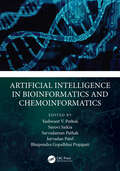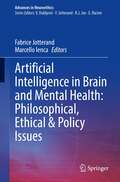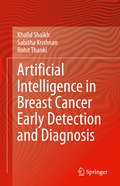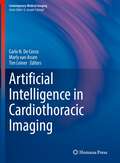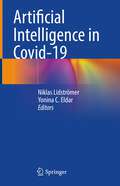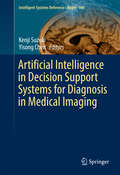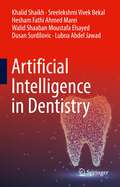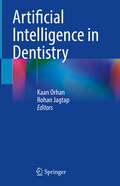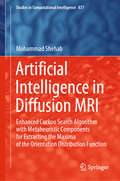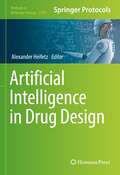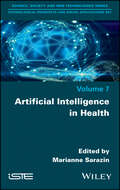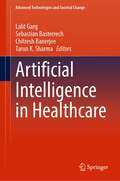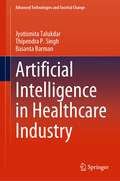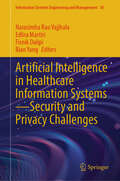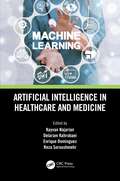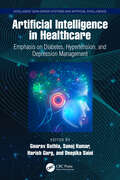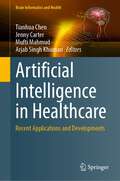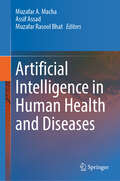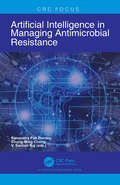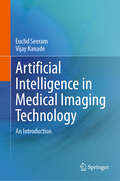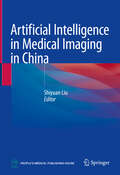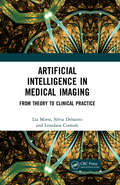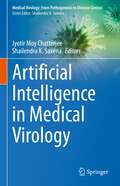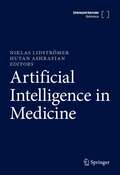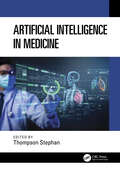- Table View
- List View
Artificial Intelligence in Bioinformatics and Chemoinformatics
by Yashwant V. PathakThe authors aim to shed light on the practicality of using machine learning in finding complex chemoinformatics and bioinformatics applications as well as identifiying AI in biological and chemical data points. The chapters are designed in such a way that they highlight the important role of AI in chemistry and bioinformatics particularly for the classification of diseases, selection of features and compounds, dimensionality reduction and more. In addition, they assist in the organization and optimal use of data points generated from experiments performed using AI techniques. This volume discusses the development of automated tools and techniques to aid in research plans. Features Covers AI applications in bioinformatics and chemoinformatics Demystifies the involvement of AI in generating biological and chemical data Provides an Introduction to basic and advanced chemoinformatics computational tools Presents a chemical biology based toolset for artificial intelligence usage in drug design Discusses computational methods in cancer, genome mapping, and stem cell research
Artificial Intelligence in Brain and Mental Health: Philosophical, Ethical & Policy Issues (Advances in Neuroethics)
by Fabrice Jotterand Marcello IencaThis volume provides an interdisciplinary collection of essays from leaders in various fields addressing the current and future challenges arising from the implementation of AI in brain and mental health. Artificial Intelligence (AI) has the potential to transform health care and improve biomedical research. While the potential of AI in brain and mental health is tremendous, its ethical, regulatory and social impacts have not been assessed in a comprehensive and systemic way. The volume is structured according to three main sections, each of them focusing on different types of AI technologies. Part 1, Big Data and Automated Learning: Scientific and Ethical Considerations, specifically addresses issues arising from the use of AI software, especially machine learning, in the clinical context or for therapeutic applications. Part 2, AI for Digital Mental Health and Assistive Robotics: Philosophical and Regulatory Challenges, examines philosophical, ethical and regulatory issues arising from the use of an array of technologies beyond the clinical context. In the final section of the volume, Part 3 entitled AI in Neuroscience and Neurotechnology: Ethical, Social and Policy Issues, contributions examine some of the implications of AI in neuroscience and neurotechnology and the regulatory gaps or ambiguities that could potentially hamper the responsible development and implementation of AI solutions in brain and mental health. In light of its comprehensiveness and multi-disciplinary character, this book marks an important milestone in the public understanding of the ethics of AI in brain and mental health and provides a useful resource for any future investigation in this crucial and rapidly evolving area of AI application. The book is of interest to a wide audience in neuroethics, robotics, computer science, neuroscience, psychiatry and mental health.
Artificial Intelligence in Breast Cancer Early Detection and Diagnosis
by Rohit Thanki Khalid Shaikh Sabitha KrishnanThis book provides an introduction to next generation smart screening technology for medical image analysis that combines artificial intelligence (AI) techniques with digital screening to develop innovative methods for detecting breast cancer. The authors begin with a discussion of breast cancer, its characteristics and symptoms, and the importance of early screening.They then provide insight on the role of artificial intelligence in global healthcare, screening methods for breast cancer using mammogram, ultrasound, and thermogram images, and the potential benefits of using AI-based systems for clinical screening to more accurately detect, diagnose, and treat breast cancer.Discusses various existing screening methods for breast cancerPresents deep information on artificial intelligence-based screening methods Discusses cancer treatment based on geographical differences and cultural characteristics
Artificial Intelligence in Cardiothoracic Imaging (Contemporary Medical Imaging)
by Carlo N. De Cecco Marly Van Assen Tim LeinerThis book provides an overview of current and potential applications of artificial intelligence (AI) for cardiothoracic imaging. Most AI systems used in medical imaging are data-driven and based on supervised machine learning. Clinicians and AI specialists can contribute to the development of an AI system in different ways, focusing on their respective strengths. Unfortunately, communication between these two sides is far from fluent and, from time to time, they speak completely different languages. Mutual understanding and collaboration are imperative because the medical system is based on physicians’ ability to take well-informed decisions and convey their reasoning to colleagues and patients.This book offers unique insights and informative chapters on the use of AI for cardiothoracic imaging from both the technical and clinical perspective. It is also a single comprehensive source that provides a complete overview of the entire process of the development and use of AI in clinical practice for cardiothoracic imaging. The book contains chapters focused on cardiac and thoracic applications as well more general topics on the potentials and pitfalls of AI in medical imaging. Separate chapters will discuss the valorization, regulations surrounding AI, cost-effectiveness, and future perspective for different countries and continents. This book is an ideal guide for clinicians (radiologists, cardiologists etc.) interested in working with AI, whether in a research setting developing new AI applications or in a clinical setting using AI algorithms in clinical practice. The book also provides clinical insights and overviews for AI specialists who want to develop clinically relevant AI applications.
Artificial Intelligence in Covid-19
by Yonina C. Eldar Niklas LidströmerThis book deals with the advantages of using artificial intelligence (AI) in the fight against the COVID-19 and against future pandemics that could threat humanity and our environment. This book is a practical, scientific and clinically relevant example of how medicine and mathematics will fuse in the 2020s, out of external pandemic pressure and out of scientific evolutionary necessity. This book contains a unique blend of the world's leading researchers, both in medicine, mathematics, computer science, clinical and preclinical medicine, and presents the research front of the usage of AI against pandemics. Equipped with this book the reader will learn about the latest AI advances against COVID-19, and how mathematics and algorithms can aid in preventing its spreading course, treatments, diagnostics, vaccines, clinical management and future evolution.
Artificial Intelligence in Decision Support Systems for Diagnosis in Medical Imaging (Intelligent Systems Reference Library #140)
by Kenji Suzuki Yisong ChenThis book offers the first comprehensive overview of artificial intelligence (AI) technologies in decision support systems for diagnosis based on medical images, presenting cutting-edge insights from thirteen leading research groups around the world. Medical imaging offers essential information on patients' medical condition, and clues to causes of their symptoms and diseases. Modern imaging modalities, however, also produce a large number of images that physicians have to accurately interpret. This can lead to an "information overload" for physicians, and can complicate their decision-making. As such, intelligent decision support systems have become a vital element in medical-image-based diagnosis and treatment. Presenting extensive information on this growing field of AI, the book offers a valuable reference guide for professors, students, researchers and professionals who want to learn about the most recent developments and advances in the field.
Artificial Intelligence in Dentistry
by Khalid Shaikh Sreelekshmi Vivek Bekal Hesham Fathi Marei Walid Shaaban Elsayed Dusan Surdilovic Lubna Abdel JawadThis book provides an introduction to next-generation applications and technologies for improving diagnostic accuracy and prediction of treatment outcomes in dentistry through the use of artificial intelligence (AI) and machine learning (ML). The authors attempt to bridge the gap between dental research and global health outcomes, as well as provide a comprehensive guide to general and clinical aspects of dental and oral health issues and the etiology, prevalence, assessment, and management of these conditions. This book combines engineering applications and medical healthcare and will be an important reference for researchers, biomedical engineers, dental students, and dental practitioners.
Artificial Intelligence in Dentistry
by Kaan Orhan Rohan JagtapThis comprehensive book focuses on various aspects of artificial intelligence in dentistry, assisting dentists, specialists, and scientists in advancing their understanding, knowledge, training, and expertise in this field of artificial intelligence. Readers will learn about AI-supported pathways for the diagnosis and treatment of dental caries, periodontal bone loss, impacted teeth, periapical lesions, crown, and root fractures, working length determination, and detecting root and canal morphology, TMJ disorders, detection of obstructive sleep apnea, oral mucosal lesions, and many more. Prediction tasks include the estimation of retreatment needs and third molar eruption. Critical information on applications of AI in the field of Oral and Maxillofacial Radiology, Implants, Endodontics, Prosthodontics, Restorative dentistry, Oral surgery, Periodontics, and Orthodontics. Gain valuable insight into studies applying machine learning based on Machine Learning (ML), Deep Learning (DL), and Artificial Neural Networks (ANN). Explore the technical aspects and medical applications of AI in dentistry. Additionally, discover cutting-edge topics like 3D and bioprinting applications of AI and its integration into dental education. All the chapters provide thorough, evidence-based data on AI and its implications in oral health, bridging the gap between knowledge and practical application. The book explains the advantages, disadvantages, and limitations of AI in dental health. Delve into the medico-legal aspects of AI to navigate this cutting-edge landscape responsibly. Learn about applications of Machine Learning and Artificial Intelligence in the Covid-19 Pandemic. Extensive information on deep learning in image processing, including various types of neural networks, image segmentation, enhancement, reconstruction, and registration. This book concludes with an exploration of AI's exciting potential and future perspectives in the dental field, paving the way for a new era of oral healthcare. Don't miss out on this unique resource for AI in Dentistry, which empowers you to stay at the forefront of innovation and embrace the AI revolution in Dentistry. Be prepared for the future of dentistry.
Artificial Intelligence in Diffusion MRI: Enhanced Cuckoo Search Algorithm with Metaheuristic Components for Extracting the Maxima of the Orientation Distribution Function (Studies in Computational Intelligence #877)
by Mohammad ShehabThis book focuses on the use of artificial intelligence to address a specific problem in the brain – the orientation distribution function. It discusses three aspects: (i) Preparing, enhancing and evaluating one of the cuckoo search algorithms (CSA); (ii) Describing the problem: Diffusion-weighted magnetic resonance imaging (DW-MRI) is used for non-invasive investigations of anatomical connectivity in the human brain, while Q-ball imaging (QBI) is a diffusion MRI reconstruction technique based on the orientation distribution function (ODF), which detects the dominant fiber orientations; however, ODF lacks local estimation accuracy along the path. (iii) Evaluating the performance of the CSA versions in solving the ODF problem using synthetic and real-world data. This book appeals to both postgraduates and researchers who are interested in the fields of medicine and computer science.
Artificial Intelligence in Drug Design (Methods in Molecular Biology #2390)
by Alexander HeifetzThis volume looks at applications of artificial intelligence (AI), machine learning (ML), and deep learning (DL) in drug design. The chapters in this book describe how AI/ML/DL approaches can be applied to accelerate and revolutionize traditional drug design approaches such as: structure- and ligand-based, augmented and multi-objective de novo drug design, SAR and big data analysis, prediction of binding/activity, ADMET, pharmacokinetics and drug-target residence time, precision medicine and selection of favorable chemical synthetic routes. How broadly are these approaches applied and where do they maximally impact productivity today and potentially in the near future. Written in the highly successful Methods in Molecular Biology series format, chapters include introductions to their respective topics, lists of the necessary software and tools, step-by-step, readily reproducible modeling protocols, and tips on troubleshooting and avoiding known pitfalls. Cutting-edge and unique, Artificial Intelligence in Drug Design is a valuable resource for structural and molecular biologists, computational and medicinal chemists, pharmacologists and drug designers.
Artificial Intelligence in Health
by Marianne SarazinUndeniable, inescapable, exhilarating and breaking free from the exclusive domain of science, artificial intelligence has become our main preoccupation. A major generator of new mathematical thinking, AI is the result of easy access to information and data, as facilitated by computer technology. Big Data has come to be seen as an unlimited source of knowledge, the use of which is still being fully explored, but its industrialization has swiftly followed in the footsteps of mathematicians; today's tools are increasingly designed to replace human beings, which comes with social and philosophical consequences. Drawing on examples of scientific work and the insights of experts, this book offers food for thought on the consequences and future of AI technology in education, health, the workplace and aging.
Artificial Intelligence in Healthcare (Advanced Technologies and Societal Change)
by Tarun K. Sharma Chitresh Banerjee Lalit Garg Sebastian BasterrechThis book highlights the analytics and optimization issues in healthcare systems, proposes new approaches, and presents applications of innovative approaches in real facilities. In the past few decades, there has been an exponential rise in the application of swarm intelligence techniques for solving complex and intricate problems arising in healthcare. The versatility of these techniques has made them a favorite among scientists and researchers working in diverse areas. The primary objective of this book is to bring forward thorough, in-depth, and well-focused developments of hybrid variants of swarm intelligence algorithms and their applications in healthcare systems.
Artificial Intelligence in Healthcare Industry (Advanced Technologies and Societal Change)
by Jyotismita Talukdar Thipendra P. Singh Basanta BarmanThis book presents a systematic evolution of artificial intelligence (AI), its applications, challenges and solutions in the field of healthcare. The book mainly covers the foundations and various methods of learning in artificial intelligence with its application in healthcare industry. This book provides a comprehensive introduction to data analysis using AI as a tool in the generation, normalization and analysis of healthcare data in association with several evaluation techniques and accuracy measurements. The book is divided into three major sections describing the basic foundations of AI and its associated algorithms, history of artificial intelligence in healthcare, recent developments and several modeling techniques for the same. The last section of the book provides insights into several implementations and methods of evaluation and accuracy prediction for healthcare analysis in AI. Extensive use of data for analysis and prediction using several technologies has transformed the lives of normal people indirectly effecting our process to communicate, learn, work and socialize within the society. Thus, the book also provides an insight into the ethics of AI that is very vital in the process of implementation and evaluation of healthcare data. The book provides an organized analysis to a considerable part of data in a digitized society. In view of this, it covers the theory, methodology, perfection and verification of empirical work for health-related data processing. Particular attention is devoted to in-depth experiments and applications.
Artificial Intelligence in Healthcare Information Systems—Security and Privacy Challenges (Information Systems Engineering and Management #34)
by Narasimha Rao Vajjhala Edlira Martiri Fisnik Dalipi Bian Yang“Artificial Intelligence (AI) in Healthcare Information Systems: Security and Privacy Challenges” offers a deep dive into the integration of AI in healthcare, with a primary focus on addressing the significant security and privacy concerns that arise in this domain. The chapters in this book highlight the transformative potential of AI in diagnosing and predicting diseases, as well as its impact on fields like fetal medicine, but places special emphasis on the need for robust encryption, data protection techniques, and ethical considerations to safeguard sensitive healthcare data. The book also explores global case studies, from India to Kazakhstan, outlining the challenges and prospects of AI adoption in diverse healthcare settings. Readers will gain insights into AI's role in improving patient outcomes while navigating the complexities of data privacy and security. The book is a valuable resource for healthcare professionals, technologists, and policymakers who are focused on implementing AI-driven solutions securely and ethically in healthcare systems.
Artificial Intelligence in Healthcare and Medicine
by Kayvan NajarianThis book provides a comprehensive overview of the recent developments in clinical decision support systems, precision health, and data science in medicine. The book targets clinical researchers and computational scientists seeking to understand the recent advances of artificial intelligence (AI) in health and medicine. Since AI and its applications are believed to have the potential to revolutionize healthcare and medicine, there is a clear need to explore and investigate the state-of-the-art advancements in the field. This book provides a detailed description of the advancements, challenges, and opportunities of using AI in medical and health applications. Over 10 case studies are included in the book that cover topics related to biomedical image processing, machine learning for healthcare, clinical decision support systems, visualization of high dimensional data, data security and privacy, bioinformatics, and biometrics. The book is intended for clinical researchers and computational scientists seeking to understand the recent advances of AI in health and medicine. Many universities may use the book as a secondary training text. Companies in the healthcare sector can greatly benefit from the case studies covered in the book. Moreover, this book also: Provides an overview of the recent developments in clinical decision support systems, precision health, and data science in medicine Examines the advancements, challenges, and opportunities of using AI in medical and health applications Includes 10 cases for practical application and reference Kayvan Najarian is a Professor in the Department of Computational Medicine and Bioinformatics, Department of Electrical Engineering and Computer Science, and Department of Emergency Medicine at the University of Michigan, Ann Arbor. Delaram Kahrobaei is the University Dean for Research at City University of New York (CUNY), a Professor of Computer Science and Mathematics, Queens College CUNY, and the former Chair of Cyber Security, University of York. Enrique Domínguez is a professor in the Department of Computer Science at the University of Malaga and a member of the Biomedical Research Institute of Malaga. Reza Soroushmehr is a Research Assistant Professor in the Department of Computational Medicine and Bioinformatics and a member of the Michigan Center for Integrative Research in Critical Care, University of Michigan, Ann Arbor.
Artificial Intelligence in Healthcare: Emphasis on Diabetes, Hypertension, and Depression Management (Intelligent Data-Driven Systems and Artificial Intelligence)
by Harish Garg Deepika Saini Gourav Bathla Sanoj KumarThis book presents state-of-the-art research works for a better understanding of the advantages and limitations of AI techniques in the field of healthcare. It will further discuss artificial intelligence applications in depression, hypertension and diabetes management. The text also presents an artificial intelligence chatbot for depression, diabetes, and hypertension self-help.This book: Provides a structured overview of recent developments of artificial intelligence applications in the healthcare sector. Presents an in-depth understanding of how artificial intelligence techniques can be applied to diabetes management. Showcases supervised learning techniques based on datasets for depression management. Discusses artificial intelligence chatbot for diabetes, depression, and hypertension self-care. Highlights the importance of artificial intelligence in managing and predicting diabetes, hypertension, and depression. The text is primarily written for senior undergraduate, graduate students, and academic researchers in diverse fields including electrical engineering, electronics and communications engineering, computer science and engineering, and biomedical engineering.
Artificial Intelligence in Healthcare: Recent Applications and Developments (Brain Informatics and Health)
by Jenny Carter Mufti Mahmud Arjab Singh Khuman Tianhua ChenRecent advances in artificial intelligence (AI) and machine learning have witnessed many successes in various disciplines including the healthcare sector. Innovations in intelligent medical systems have revolutionized the way in which healthcare services are provided, ranging from making clinical diagnosis, developing personalized treatment and drugs, assisting patient monitoring, to automating administrative tasks and reducing operational costs. In this book, the authors present key applications in the general area of health care, where AI has made significant successes. From the individual chapters, the readers will be provided with a range of examples to illustrate the wide plethora of application domains utilizing state-of-the-art AI techniques, proving credence to the versatility and effectiveness of an AI approach in health care and medicine. We envisage that this book is ideal for individuals new to the notion of AI in health care, equally, early career academics who wish to further expand on their knowledge in AI in medicine. What will be presented is in no means an exhaustive list of applications, but most definitely a varied one.
Artificial Intelligence in Human Health and Diseases
by Muzafar A. Macha Assif Assad Muzafar Rasool BhatThis book discusses current concepts and future translational possibilities of Artificial Intelligence (AI) in human healthcare and diseases. The initial chapter reviews the application and integration of AI and multi-omics to develop novel diagnostic and therapeutic strategies. The book chapter also explores the recent advances in data-driven approaches that aided state-of-the-art AI for biomarker discovery and better disease diagnosis. The book also offers computational and oncological prospects for the role of AI in radio genomics, as well as its offers, achievements, opportunities, and limitations in the current clinical practices. The chapters further cover the role of the current state of AI in Cardiovascular Disease, Obesity and Diabetes, Neurological Diseases, and Infectious Diseases. Towards the end, the book highlights the use of AI in diverse pharmaceutical industry sectors, including drug discovery and development, drug repurposing, and improving pharmaceutical productivity. This book is handy for basic, translational, clinical & interdisciplinary researchers and bioinformaticians.
Artificial Intelligence in Managing Antimicrobial Resistance
by Ramendra Pati Pandey Chung-Ming Chang V. Samuel RajThis volume reviews the use of machine learning (ML) to predict antibiotic resistance in pathogens based on gene content and genome composition as data sets comprising hundreds or thousands of pathogen genomes become available. One of the main goals of this work is to promote the use of ML in front-line contexts while simultaneously emphasizing the additional improvements that are required to use these techniques in a secure and confident manner. Given the variety of quantitative and qualitative laboratory indicators of AMR, the issue of what to anticipate is not an easy one.This book is intended for academia, students of medical science, microbiology, biology, and biotechnology, as well as experts and scientists working in the fields of infectious diseases, government health organizations, and medicine.
Artificial Intelligence in Medical Imaging Technology: An Introduction
by Euclid Seeram Vijay KanadeThis book covers the principles, concepts, and applications of artificial intelligence in medical imaging technologies, specifically in the context of diagnostic imaging, such as radiography and radiological technology. First, artificial intelligence and its subsets machine learning and deep learning are described followed by a discussion of applications of these AI principles in medical imaging technologies. Finally, ethical questions, regulatory aspects, and future trends and challenges are also reviewed in this textbook. This book is intended for both students and practitioners in radiological technology, radiography, radiation therapy, nuclear medicine technology, diagnostic medical sonography, and biomedical engineering technology. Furthermore, residents in radiology, and medical physics students and related healthcare personnel (administrators and managers for example) may find this book useful.
Artificial Intelligence in Medical Imaging in China
by Shiyuan LiuThis book overviews the latest development of Artificial Intelligence in medical imaging in China. Consisted of thirteen chapters, this book discusses development, status, achievements, prospects, visions, bottlenecks, and future challenges affecting development of artificial intelligence in medical imaging from different aspects of government supervision, industrialization, education, academic research and application implementation. It will facilitate better communication between China and foreign countries in all directions of medical imaging AI for all stakeholders.
Artificial Intelligence in Medical Imaging: From Theory to Clinical Practice
by Lia Morra Silvia Delsanto Loredana CorrealeChoice Recommended Title, January 2021 This book, written by authors with more than a decade of experience in the design and development of artificial intelligence (AI) systems in medical imaging, will guide readers in the understanding of one of the most exciting fields today. After an introductory description of classical machine learning techniques, the fundamentals of deep learning are explained in a simple yet comprehensive manner. The book then proceeds with a historical perspective of how medical AI developed in time, detailing which applications triumphed and which failed, from the era of computer aided detection systems on to the current cutting-edge applications in deep learning today, which are starting to exhibit on-par performance with clinical experts. In the last section, the book offers a view on the complexity of the validation of artificial intelligence applications for commercial use, describing the recently introduced concept of software as a medical device, as well as good practices and relevant considerations for training and testing machine learning systems for medical use. Open problematics on the validation for public use of systems which by nature continuously evolve through new data is also explored. The book will be of interest to graduate students in medical physics, biomedical engineering and computer science, in addition to researchers and medical professionals operating in the medical imaging domain, who wish to better understand these technologies and the future of the field. Features: An accessible yet detailed overview of the field Explores a hot and growing topic Provides an interdisciplinary perspective
Artificial Intelligence in Medical Virology (Medical Virology: From Pathogenesis to Disease Control)
by Jyotir Moy Chatterjee Shailendra K. SaxenaThis book comprehensively reviews the potential of Artificial Intelligence (AI) in biomedical research and healthcare, with a major emphasis on virology. The initial chapter presents the applications of machine learning methods for structured data, such as the classical support vector machine and neural network, modern deep learning, and natural language processing for unstructured data in biomedical research and healthcare. The subsequent chapters explore the applications of AI in tackling COVID-19, analysis of the pandemic, viral infection, disease spread, and control. The book further identifies the potential applications of machine learning in the field of virology with a focus on the key aspects of infection: diagnosis, transmission, response to treatment, and resistance. The book also discusses progress and challenges in developing viral vaccines and examines the application of viruses in translational research and human healthcare. Furthermore, the book covers the applications of artificial intelligence-mediated diagnosis and the development of drugs to treat the disease. Towards the end, the book summarizes the ethical and legal challenges posed by AI in healthcare and biomedical research. This book is an invaluable source for researchers, medical and industry practitioners, academicians, and students exploring the applications of AI in biomedical research and healthcare.
Artificial Intelligence in Medicine
by Hutan Ashrafian Niklas LidströmerThis book provides a structured and analytical guide to the use of artificial intelligence in medicine. Covering all areas within medicine, the chapters give a systemic review of the history, scientific foundations, present advances, potential trends, and future challenges of artificial intelligence within a healthcare setting. Artificial Intelligence in Medicine aims to give readers the required knowledge to apply artificial intelligence to clinical practice. The book is relevant to medical students, specialist doctors, and researchers whose work will be affected by artificial intelligence.
Artificial Intelligence in Medicine
by Thompson StephanIn the ever-evolving realm of healthcare, Artificial Intelligence in Medicine emerges as a trailblazing guide, offering an extensive exploration of the transformative power of Artificial Intelligence (AI). Crafted by leading experts in the field, this book sets out to bridge the gap between theoretical understanding and practical application, presenting a comprehensive journey through the foundational principles, cutting-edge applications, and the potential impact of AI in the medical landscape.This book embarks on a journey from foundational principles to advanced applications, presenting a holistic perspective on the integration of AI into diverse aspects of medicine. With a clear aim to cater to both researchers and practitioners, the scope extends from fundamental AI techniques to their innovative applications in disease detection, prediction, and patient care.Distinguished by its practical orientation, each chapter presents actionable workflows, making theoretical concepts directly applicable to real-world medical scenarios. This unique approach sets the book apart, making it an invaluable resource for learners and practitioners alike.Key Features:• Comprehensive Exploration: From deep learning approaches for cardiac arrhythmia to advanced algorithms for ocular disease detection, the book provides an in-depth exploration of critical topics, ensuring a thorough understanding of AI in medicine.• Cutting-Edge Applications: The book delves into cutting-edge applications, including a vision transformer-based approach for brain tumor detection, early diagnosis of skin cancer, and a deep learning-based model for early detection of COVID-19 using chest X-ray images.• Practical Insights: Practical workflows and demonstrations guide readers through the application of AI techniques in real-world medical scenarios, offering insights that transcend theoretical boundaries.This book caters to researchers, practitioners, and students in medicine, computer science, and healthcare technology. With a focus on practical applications, this book is an essential guide for navigating the dynamic intersection of AI and medicine. Whether you are an expert or a newcomer to the field, this comprehensive volume provides a roadmap to the revolutionary impact of AI on the future of healthcare.
